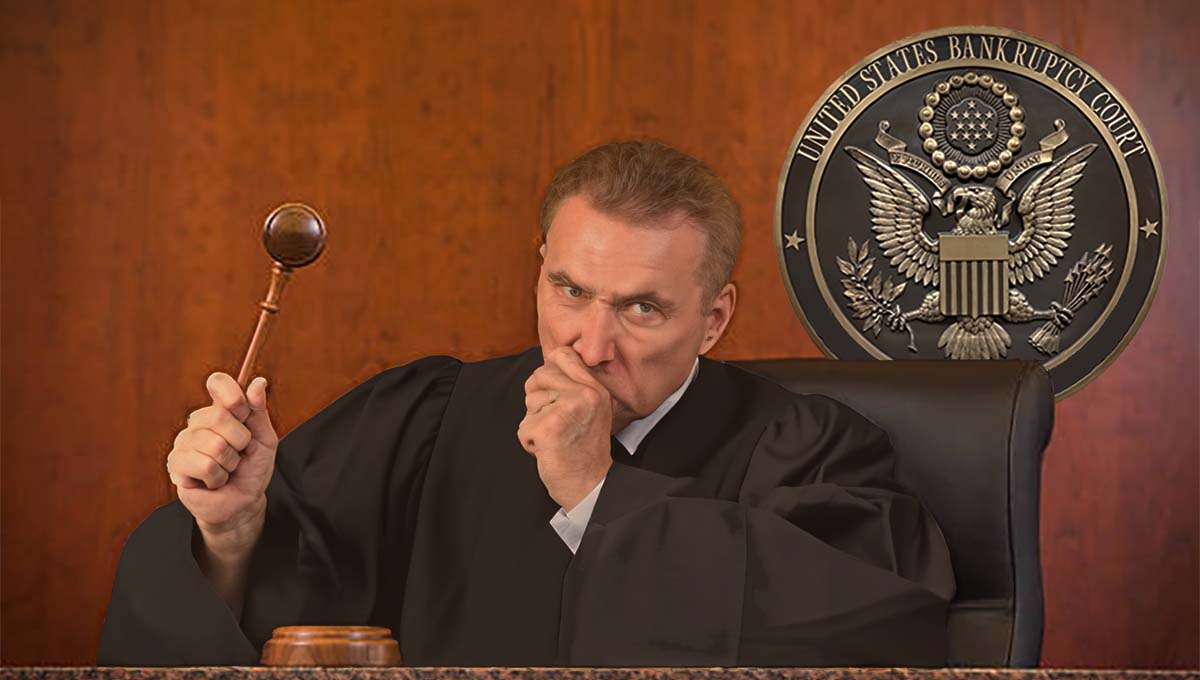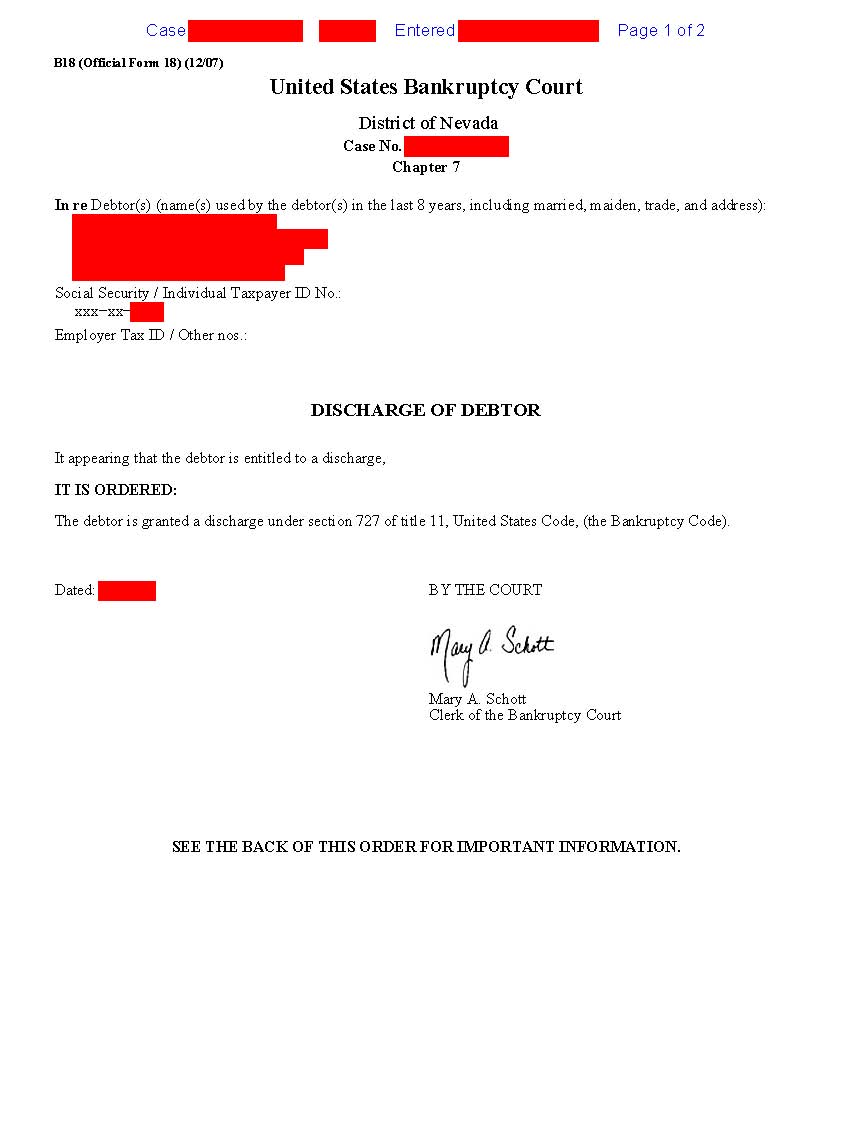Chapter 7 Discharge
Chapter 7 Discharge - Most debts can be removed after filing for chapter 7 bankruptcy. Findlaw outlines what a chapter 7 discharge is, including debts. The bankruptcy discharge varies depending on the type of case a debtor files: Chapter 7, 11, 12, or 13. Bankruptcy basics attempts to answer some. An individual receives a discharge for most of his or her debts in a chapter 7 bankruptcy case. A discharge erases your debt, a discharge order is the official court form erasing your debt, and the final decree is the official court form. A creditor may no longer initiate or continue any.
Most debts can be removed after filing for chapter 7 bankruptcy. Findlaw outlines what a chapter 7 discharge is, including debts. A discharge erases your debt, a discharge order is the official court form erasing your debt, and the final decree is the official court form. Chapter 7, 11, 12, or 13. An individual receives a discharge for most of his or her debts in a chapter 7 bankruptcy case. A creditor may no longer initiate or continue any. The bankruptcy discharge varies depending on the type of case a debtor files: Bankruptcy basics attempts to answer some.
A discharge erases your debt, a discharge order is the official court form erasing your debt, and the final decree is the official court form. Most debts can be removed after filing for chapter 7 bankruptcy. An individual receives a discharge for most of his or her debts in a chapter 7 bankruptcy case. Findlaw outlines what a chapter 7 discharge is, including debts. A creditor may no longer initiate or continue any. Bankruptcy basics attempts to answer some. Chapter 7, 11, 12, or 13. The bankruptcy discharge varies depending on the type of case a debtor files:
Discharge 7 Complete with ease airSlate SignNow
Chapter 7, 11, 12, or 13. Findlaw outlines what a chapter 7 discharge is, including debts. An individual receives a discharge for most of his or her debts in a chapter 7 bankruptcy case. The bankruptcy discharge varies depending on the type of case a debtor files: A discharge erases your debt, a discharge order is the official court form.
discharge of debtor chapter 7 YouTube
An individual receives a discharge for most of his or her debts in a chapter 7 bankruptcy case. A creditor may no longer initiate or continue any. A discharge erases your debt, a discharge order is the official court form erasing your debt, and the final decree is the official court form. Bankruptcy basics attempts to answer some. Most debts.
The Chapter 7 Discharge Chapter 7 Bankruptcy Attorneys ARM Lawyers
A creditor may no longer initiate or continue any. Most debts can be removed after filing for chapter 7 bankruptcy. An individual receives a discharge for most of his or her debts in a chapter 7 bankruptcy case. The bankruptcy discharge varies depending on the type of case a debtor files: Findlaw outlines what a chapter 7 discharge is, including.
40+ What Happens After Chapter 7 Discharge BreaDalleas
A creditor may no longer initiate or continue any. Chapter 7, 11, 12, or 13. Most debts can be removed after filing for chapter 7 bankruptcy. An individual receives a discharge for most of his or her debts in a chapter 7 bankruptcy case. The bankruptcy discharge varies depending on the type of case a debtor files:
Discharge Chapter 7 Bankruptcy
Bankruptcy basics attempts to answer some. An individual receives a discharge for most of his or her debts in a chapter 7 bankruptcy case. The bankruptcy discharge varies depending on the type of case a debtor files: A creditor may no longer initiate or continue any. Most debts can be removed after filing for chapter 7 bankruptcy.
The Chapter 7 Discharge Chapter 7 Bankruptcy Attorneys ARM Lawyers
A discharge erases your debt, a discharge order is the official court form erasing your debt, and the final decree is the official court form. A creditor may no longer initiate or continue any. Most debts can be removed after filing for chapter 7 bankruptcy. Findlaw outlines what a chapter 7 discharge is, including debts. An individual receives a discharge.
Why Your Chapter 7 Bankruptcy Can Be Denied
Bankruptcy basics attempts to answer some. Findlaw outlines what a chapter 7 discharge is, including debts. A discharge erases your debt, a discharge order is the official court form erasing your debt, and the final decree is the official court form. The bankruptcy discharge varies depending on the type of case a debtor files: A creditor may no longer initiate.
What do my bankruptcy discharge papers look like?
A creditor may no longer initiate or continue any. The bankruptcy discharge varies depending on the type of case a debtor files: Bankruptcy basics attempts to answer some. An individual receives a discharge for most of his or her debts in a chapter 7 bankruptcy case. Findlaw outlines what a chapter 7 discharge is, including debts.
Understanding Chapter 7 Bankruptcy Discharge and its Exceptions
Chapter 7, 11, 12, or 13. Findlaw outlines what a chapter 7 discharge is, including debts. The bankruptcy discharge varies depending on the type of case a debtor files: A discharge erases your debt, a discharge order is the official court form erasing your debt, and the final decree is the official court form. An individual receives a discharge for.
SOLUTION Chapter 7 discharge Studypool
A creditor may no longer initiate or continue any. Chapter 7, 11, 12, or 13. A discharge erases your debt, a discharge order is the official court form erasing your debt, and the final decree is the official court form. The bankruptcy discharge varies depending on the type of case a debtor files: An individual receives a discharge for most.
The Bankruptcy Discharge Varies Depending On The Type Of Case A Debtor Files:
Findlaw outlines what a chapter 7 discharge is, including debts. An individual receives a discharge for most of his or her debts in a chapter 7 bankruptcy case. A discharge erases your debt, a discharge order is the official court form erasing your debt, and the final decree is the official court form. Chapter 7, 11, 12, or 13.
Bankruptcy Basics Attempts To Answer Some.
Most debts can be removed after filing for chapter 7 bankruptcy. A creditor may no longer initiate or continue any.



:max_bytes(150000):strip_icc()/bankruptcy-discharge-what-is-it-and-when-does-it-happen-8eafb0f711c24a048d4854a82cdb5f70.png)





